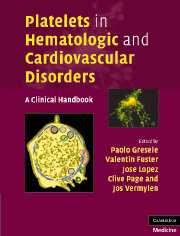Book contents
- Frontmatter
- Contents
- List of contributors
- Preface
- Glossary
- 1 The structure and production of blood platelets
- 2 Platelet immunology: structure, functions, and polymorphisms of membrane glycoproteins
- 3 Mechanisms of platelet activation
- 4 Platelet priming
- 5 Platelets and coagulation
- 6 Vessel wall-derived substances affecting platelets
- 7 Platelet–leukocyte–endothelium cross talk
- 8 Laboratory investigation of platelets
- 9 Clinical approach to the bleeding patient
- 10 Thrombocytopenia
- 11 Reactive and clonal thrombocytosis
- 12 Congenital disorders of platelet function
- 13 Acquired disorders of platelet function
- 14 Platelet transfusion therapy
- 15 Clinical approach to the patient with thrombosis
- 16 Pathophysiology of arterial thrombosis
- 17 Platelets and atherosclerosis
- 18 Platelets in other thrombotic conditions
- 19 Platelets in respiratory disorders and inflammatory conditions
- 20 Platelet pharmacology
- 21 Antiplatelet therapy versus other antithrombotic strategies
- 22 Laboratory monitoring of antiplatelet therapy
- 23 Antiplatelet therapies in cardiology
- 24 Antithrombotic therapy in cerebrovascular disease
- 25 Antiplatelet treatment in peripheral arterial disease
- 26 Antiplatelet treatment of venous thromboembolism
- Index
21 - Antiplatelet therapy versus other antithrombotic strategies
Published online by Cambridge University Press: 15 October 2009
- Frontmatter
- Contents
- List of contributors
- Preface
- Glossary
- 1 The structure and production of blood platelets
- 2 Platelet immunology: structure, functions, and polymorphisms of membrane glycoproteins
- 3 Mechanisms of platelet activation
- 4 Platelet priming
- 5 Platelets and coagulation
- 6 Vessel wall-derived substances affecting platelets
- 7 Platelet–leukocyte–endothelium cross talk
- 8 Laboratory investigation of platelets
- 9 Clinical approach to the bleeding patient
- 10 Thrombocytopenia
- 11 Reactive and clonal thrombocytosis
- 12 Congenital disorders of platelet function
- 13 Acquired disorders of platelet function
- 14 Platelet transfusion therapy
- 15 Clinical approach to the patient with thrombosis
- 16 Pathophysiology of arterial thrombosis
- 17 Platelets and atherosclerosis
- 18 Platelets in other thrombotic conditions
- 19 Platelets in respiratory disorders and inflammatory conditions
- 20 Platelet pharmacology
- 21 Antiplatelet therapy versus other antithrombotic strategies
- 22 Laboratory monitoring of antiplatelet therapy
- 23 Antiplatelet therapies in cardiology
- 24 Antithrombotic therapy in cerebrovascular disease
- 25 Antiplatelet treatment in peripheral arterial disease
- 26 Antiplatelet treatment of venous thromboembolism
- Index
Summary
INTRODUCTION
Mechanisms of thrombogenesis are closely linked, with activation of both the coagulation and platelet aggregation pathways being responsible for thrombus formation.
Thrombin, a key clotting enzyme generated by blood coagulation, is a very potent platelet activator. At the same time, activated platelets provide a platform for the coagulation process. Therefore combination therapy with antiplatelet agents and anticoagulants should be effective in the prevention and treatment of arterial and venous thrombosis. Conversely, considering the pathophysiology, antiplatelet therapy would be more effective in the case of arterial thrombosis, whereas anticoagulants would have superior efficacy in venous and cardiac thromboembolism (Fig. 21.1).
The real stand of antiplatelet therapy versus other antithrombotic strategies and their combination can be derived from studies assessing these treatment modalities in patients at risk or in those diagnosed with coronary artery disease (CAD), peripheral vascular disease, atrial fibrillation, stroke, deep venous thrombosis, and pulmonary embolism.
Antiplatelet therapy for arterial thrombosis in patients with CAD is constantly evolving. Essentially all patients with acute coronary syndrome (ACS) are currently recommended to receive dual antiplatelet therapy, including acetylsalicylic acid (ASA) and clopidogrel, with proven indications for triple antiplatelet therapy by adding GP IIb/IIIa inhibitors (GPIs) for patients with high-risk features. The search for additional benefits regarding mortality rate, cardiovascular events, bleeding, convenience, and cost of treatment is continuing.
- Type
- Chapter
- Information
- Platelets in Hematologic and Cardiovascular DisordersA Clinical Handbook, pp. 367 - 385Publisher: Cambridge University PressPrint publication year: 2007



